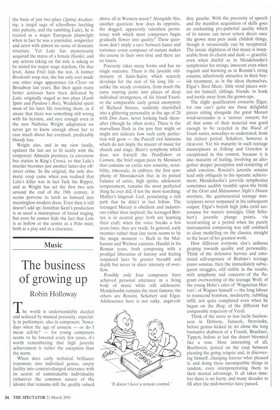The business of growing up
Robin Holloway
The world is understandably dazzled and seduced by musical precocity, especially in performers, also in composers. Nowadays when the age of consent — or do I mean sell-by? — for young composers seems to be lowered every few years, it's worth remembering that high juvenile achievement is rather the exception than the norm.
When does early technical brilliance transmute into individual genius, empty facility into content-charged utterance with its accent of unmistakable individuality (whatever the common nature of the idiom) that remains still the quality valued above all in Western music? Alongside this, another question: how does its opposite, the dogged, apparently talentless persistence with which most composers begin gradually flower into quality? These questions don't imply a race between hares and tortoises: every composer of stature makes the course in their own time and there are no losers.
Precocity takes many forms and has no single outcome. There is the juvenile oldmastery of Saint-Saens which scarcely develops for the rest of his long life — unlike the steady evolution, from much the same starting point into places of deep individual strangeness, of his friend Faure; or the comparable early genial anonymity of Richard Strauss, suddenly electrified into a glittering personality at the age of 24 with Don Juan, never looking back thereafter (though he often nods). There is the marvellous flash in the pan that might or might not indicate how such early perfection will grow — the Purcell viol fantasias which do not imply the master of music for church and stage: Bizet's symphony which does not foretell the Pear/fishers or Carmen, the brief organ piece by Messiaen that contains an entire new sonority, sensibility, timescale, in embryo; the first symphony of Shostakovich that in its poised balance of satire, high spirits, adolescent temperament, remains the most perfected thing he ever did, if not the most searching; Mahler's klagende Lied, postulating a rich path that he didn't in fact follow. The teenaged Mozart is obedient and industrious rather than inspired; the teenaged Britten is in neutral grey: both are learning their craft; when the voice breaks a few years later, they are ready. In general, early twenties rather than late teens seems to be the magic moment — Bach in the Mulhausen and Weimar cantatas, Handel in his Roman years, both composing with a prodigal liberation of fantasy and feeling surpassed later by greater breadth and depth but never in sheer intensity of overflow.
Possibly only four composers have achieved personal utterance in a living body of music while still adolescent. Mendelssohn remains the most famous; the others are Rossini, Schubert and Elgar. Adolescence here is not sulky, angst-rid
den, gauche. With the precocity of speech and the manifest acquisition of skills goes an enchanting pre-pubertal quality which of its nature can never return direct once the grown man puts aside childish things, though it occasionally can be recaptured. The innate slightness of this music is inseparable from its charm and dash — graceful, even when dutiful as in Mendelssohn's symphonies for strings; innocent even when roguish and knowing as in Rossini's string sonatas; infectiously attractive in their boyish treatment, as in the ideas themselves, Elgar's Shed Music, little wind pieces written for himself, siblings, friends, to honk and tootle away from the grown-ups.
The slight qualification concerns Elgar, for one can't quite see these delightful pieces sitting alongside the great Mozart wind-serenades in a serious' concert, for AI that some of their material was good enough to be recycled in the Wand of Youth suites, nowadays so underrated, from his richest period. Schubert, however is clear-cut. Yet his maturity in such teenage masterpieces as Er/king and Gretchen is exceptional in this context, because it is also maturity of feeling, involving an altogether deeper perception and rendering of adult emotion. Rossini's juvenile sonatas lead only obliquely to his operatic achievement; Mendelssohn's juvenile symphonies sometimes audibly tremble upon the brink of the Octet and Midsummer Night's Dream overture, the quintessential teenage masterpieces never surpassed in his subsequent output; Elgar's boyish high jinks yield sustenance for mature nostalgia. Only Schubert's juvenile plunge points, via word-setting at a period when his purely instrumental composing was still confined to close modelling on the classics, straight to the heart of his greatest work.
How different everyone else's arduous groping towards quality and personality. Think of the defensive heroics and emotional self-exposure of Brahms's teenage piano sonatas, then the immediately subsequent struggles, still visible in the results, with symphony and concerto: of the flagrant overweening of the teenage Wolf, of the young Hoist's tales of 'Wagnerian Horrors'; of Wagner himself — the long labour to transcend bombast, mediocrity, rubbling infill, not quite completed even when he began on the Ring; of the different but comparable trajectory of Verdi.
Think of the more or less facile facelessness in Debussy, Janacek, Stravinsky, before genius kicked in; let alone the long formative drabness of a Franck, Bruckner, Tippett, before at last the desert bloomed like a rose. Most interesting of all, Beethoven, poised on the cusp between pleasing the going zeitgeist and, in discovering himself, changing forever what pleased it: and doing these incompatible things in tandem, even interpenetrating them to their mutual advantage. It all takes time: but there is no hurry, and many decades to fill after the mid-twenties have passed.


























































































 Previous page
Previous page